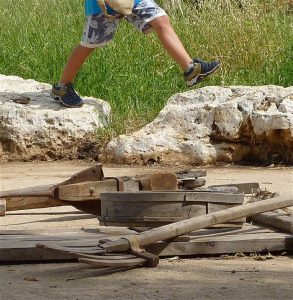Culture shock was a natural thing to experience seven years ago, when I moved to Israel. Visiting a Shabbat school lesson in one of the Israeli congregations was a part of this shock. By then I had worked in children’s ministry for ten years, but had never seen children behave in
such a way during a lesson. There and then I decided that this ministry was no longer for me – but “the gifts and calling of God are irrevocable” (Rom. 11:29), so here I am, serving children in my new country.
in my new country.
Shabbat school teachers discussing the ministry’s joys and challenges speak of almost the same things. Among the blessings, we hear about the Lord speaking to them during their preparation time and the joy of lively fellowship with the children. This is precisely what I say to every new volunteer teacher who comes to our congregation: “Don’t worry about missing the sermon and being left with no spiritual food. The Lord himself will be preaching to you as you prepare the lesson. And then you will see and hear the children, their eager interest and questions, and all of this will move you deeply.”
But what about the challenges? They are the same as well. Just recently we were planning our next national teachers’ seminar. Thinking about the needs of those who work with children in the congregations, we chose the most practical and relevant subject: discipline and boundaries. This subject concerns all teachers because often we don’t know which approaches to teaching we can use and which we can’t; which requirements of children are legitimate, and which are not. On the one hand, Scripture tells us to raise children in obedience and to discipline them for disobedience; on the other, today’s Israeli approach to raising and teaching  children often ties the hands of the teacher, obliging him or her to encourage but never pressure. The Almighty both loves and disciplines us, so the children should learn about boundaries that are given to us in love. That is biblical wisdom – teaching discipline with love. In the Israeli Messianic community, most children receive enough love and care, but in some cases boundaries and discipline are lacking.
children often ties the hands of the teacher, obliging him or her to encourage but never pressure. The Almighty both loves and disciplines us, so the children should learn about boundaries that are given to us in love. That is biblical wisdom – teaching discipline with love. In the Israeli Messianic community, most children receive enough love and care, but in some cases boundaries and discipline are lacking.
And here we come to a difficult issue on which all teachers would agree: insufficient parental involvement. As teachers, we understand that our calling is not to replace the parents, but rather to help them raise the child in the faith. But the Israeli reality is such that many parents simply cannot spend time with their children. This is especially obvious in immigrant families, where the parents have to work very hard. And so a Shabbat school teacher in Israel should pay attention to the type of family in which the child is being raised, to their social status and culture. For example, a girl from an Ethiopian family will most likely not attend some youth events, because the culture requires her to be a “second mom,” taking care of her younger siblings. And a new boy in your class from a Russian-speaking family will usually have little knowledge of Jewish tradition, so you will have to patiently explain some basics to him.
The answer to the question “Is it easy to be a Shabbat school teacher in Israel?” is obvious. The first requirement is firm commitment. And what about knowledge and necessary insights? These can be gotten from fellow teachers in other congregations, and of course also at Caspari Center’s seminars.